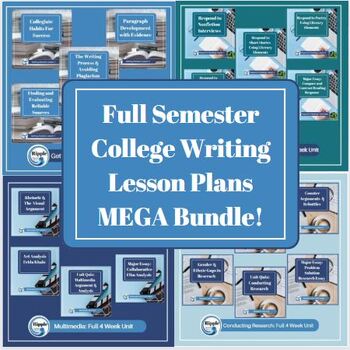College English FULL Semester 16 weeks 1301 1302 AP Writing and Research
- Google Docs™

Products in this Bundle (23)
showing 1-5 of 23 products
Description
When I started working as an adjunct professor, I had zero resources, and despite extensive searching online, I couldn't find exactly what I needed. Over the course of several years, I wrote a curriculum that I have now settled into that consists of (4) four-week units.
I use this curriculum for both 1301 and 1302 adjusting my expectations, assignment and major essay lengths and adding grammar support as needed (particularly in 1301).
Each meticulously planned lesson (intended to last 1 week) within this curriculum includes lectures, whole group activities or discussions, small group or partner activities, independent weekly writing assignments, and reflections or discussion board-type follow-ups. Each unit includes a multiple-choice mastery quiz. In addition, units 2, 3, and 4 each include a major essay to demonstrate content mastery.
There is more here than you will use in a semester allowing you to pick and choose what will suit your students best.
By scaffolding the progression from fundamental skills to advanced analytical techniques, this curriculum aims to create a holistic and enriching learning experience for students. I'm excited to share these resources with fellow educators, hoping that they will alleviate the challenges of curriculum development and enhance the educational journey for students across diverse classrooms.
Unit 1: Getting Started (Weeks 1-4) This unit serves as a foundational pillar for students as they cultivate proper writing and citation techniques, laying the groundwork for success.
- Lesson 1: Collegiate Habits for Success In this foundational lesson, students are introduced to the essential habits necessary for academic success.
- Lesson 2: Writing a Well-Developed Paragraph & Quotes Building upon the basics of academic writing, this lesson delves into the art of crafting well-structured paragraphs while incorporating relevant quotes.
- Lesson 3: The Writing Process & Avoiding Plagiarism An exploration of the writing process guides students through brainstorming, drafting, revising, and editing while addressing the crucial aspect of avoiding plagiarism and emphasizing the significance of proper citation and attribution.
- Lesson 4: Library Skills, Evaluating Claims, & MLA Citations Students develop essential library research skills, learn to critically evaluate sources, and gain proficiency in using MLA citation style.
- Lesson 5: Finding & Evaluating Reliable Sources This lesson further refines students' research skills by focusing on finding credible sources and discerning their reliability, ensuring the integrity of their academic work.
Unit 2: Respond to Reading (Weeks 5-8) In this unit students are challenged to engage deeply with various literary forms, from short stories to first hand account interviews and from poetry to song lyrics, fostering their analytical and critical response skills.
- Lesson 1: Respond to Short Stories: Adam & Eve and A Rose for Emily by Faulkner Analyzing short stories prompts students to engage deeply with literary elements, themes, and character development while honing their analytical and critical thinking abilities.
- Lesson 2: Respond to First Hand Interviews: Billy the Kid Students explore the art of responding to interviews, analyzing content, and developing informed perspectives while examining historical and contemporary figures.
- Lesson 3: Respond to Poetry: Maya Angelou and Amanda Gorman Through the lens of poetry, students explore powerful themes, literary devices, and cultural contexts, fostering a nuanced understanding of diverse poetic forms.
- Lesson 4: Respond to Lyrics: Rihanna Engaging with popular song lyrics provides a unique opportunity for students to decipher meaning, explore symbolism, and understand the intersection of language and music.
- Major Essay: Compare Contrast (Poem and Song) This lesson encourages students to compare and contrast a poem with a song, honing their analytical skills by examining different forms of artistic expression.
Unit 3: Multimedia Analysis (Weeks 9-12) This unit takes a contemporary approach by delving into visual and auditory rhetoric, encouraging students to dissect and understand the persuasive elements embedded in various mediums, including commercials, speeches, and art.
- Lesson 1: The Visual Argument Students explore the persuasive power of visual media, learning to analyze and create effective visual arguments.
- Lesson 2: Commercials, Rhetorical Appeals, & Fallacies From Michael Jackson to the Old Spice guy, an examination of commercials helps students identify rhetorical appeals and logical fallacies, enhancing their media literacy skills.
- Lesson 3: Speech Analysis: Obama’s Rhetoric Analyzing speeches exposes students to persuasive techniques, rhetorical devices, and the impact of effective oration. While revisiting 911 and Osama bin Laden.
- Lesson 4: Art Analysis: Frida Kahlo Through the study of Frida Kahlo's art, students learn to interpret visual symbolism and cultural significance, fostering art appreciation and analysis skills.
- Major Essay: Film Analysis The culmination of this unit involves a comprehensive analysis of a selected film, combining various elements of multimedia literacy into a cohesive written analysis.
Unit 4: Research (Weeks 13-16) This unit equips students with the tools necessary for conducting thorough research, refining arguments, and addressing complex social issues through the lens of well-researched essays.
- Lesson 1: Understanding Various Viewpoints Students learn to navigate diverse perspectives, enhancing their ability to understand and evaluate multiple viewpoints on complex issues.
- Lesson 2: Annotated Bibliographies This lesson focuses on creating annotated bibliographies, honing students' skills in summarizing, evaluating, and citing sources effectively.
- Lesson 3: Counterarguments Arguments & Rebuttals Developing strong arguments and counterarguments, students refine their critical thinking skills by engaging in thoughtful debates and discussions.
- Lesson 4: Gender & Ethnic Gaps in Research Examining gender and ethnic gaps in research equips students with an awareness of biases and disparities within academic discourse.
- Major Essay: Problem Solution (Social Issue) Students tackle a social issue of their choice, employing research skills and critical analysis to propose viable solutions.
This curriculum aims to foster a well-rounded educational experience, nurturing students' academic growth and preparing them for the challenges of higher education and beyond. Each unit is structured to build upon previous knowledge, promoting a seamless transition toward advanced critical thinking, writing proficiency, and multimedia literacy.


